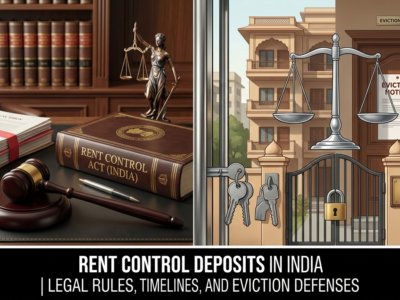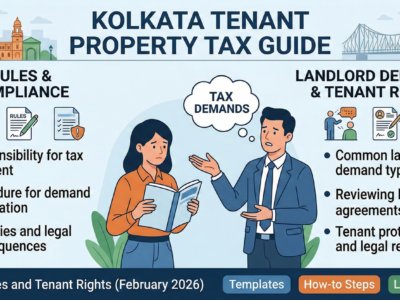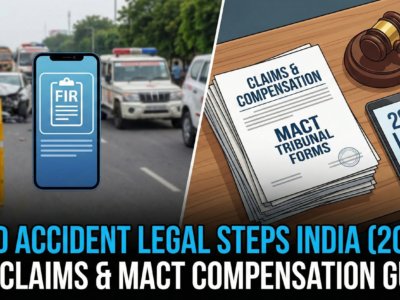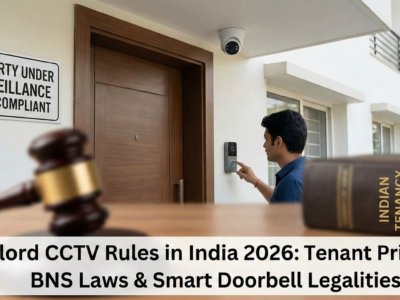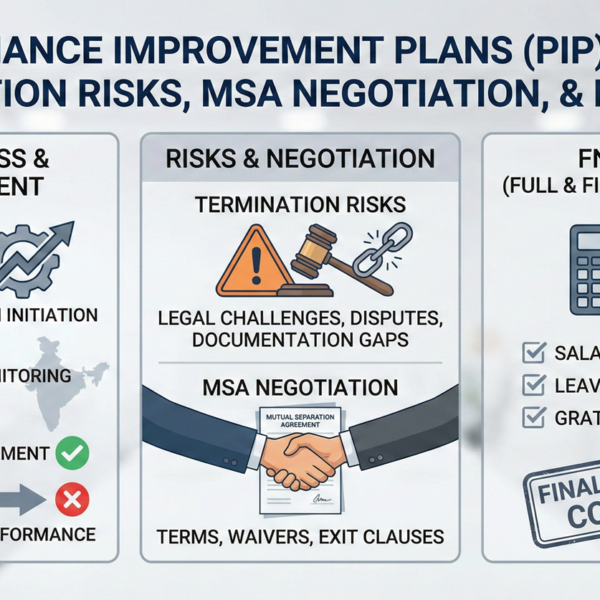“Do I need their permission?” It’s a question millions in India ask before hitting the record button on a phone call or in a tense meeting. The answer isn’t a simple yes or no. Indian law walks a fine line between your fundamental Right to Privacy and the court’s search for truth, creating a confusing legal landscape for citizens and employees alike. A secret recording could be your key piece of evidence or the reason you’re facing a lawsuit.
This comprehensive 2025 guide, prepared by eVaakil.com, is designed to demystify the law. We will break down everything you need to know about the legality of recording audio and video conversations without consent in both personal and professional settings. We’ll explore landmark Supreme Court judgments, dissect the requirements for making a recording admissible in court, analyze specific scenarios like recording an abusive boss, and provide tools to help you assess your situation.
Can You Legally Record That
Conversation in India?
A deep dive into the complex web of privacy rights, evidence laws, and the legality of recording calls and meetings in personal and professional settings.
Right to Privacy
Article 21 protects private talks. Recording without consent is a violation.
The Legal Tightrope
Balancing individual privacy against the court's need for evidence.
Admissibility in Court
Illegally obtained recordings can still be used as evidence if relevant and authentic.
The Core Legal Conflict: Privacy vs. Proof
Indian law presents a fascinating paradox. Recording someone without their consent is a violation of their fundamental Right to Privacy, yet that very recording might be the key piece of evidence that wins you a case in court. Understanding this conflict is the first step to navigating the law.
The Privacy Shield (Puttaswamy Judgment)
The Supreme Court, in *Justice K.S. Puttaswamy v. Union of India*, elevated privacy to a fundamental right under Article 21. This means any non-consensual recording of a private conversation is presumptively illegal and a civil wrong.
The Evidence Sword (Vibhor Garg v. Neha)
However, in matrimonial disputes and other cases, the Supreme Court has repeatedly held that the relevance of evidence trumps the legality of how it was obtained. If the recording is authentic and crucial, it's likely admissible.
The Law in Black & White
Beyond the constitutional debate, specific statutes outline criminal offenses related to recording and surveillance. Here’s a breakdown:
| Statute & Section | Offence | Who is protected? | Penalty |
|---|---|---|---|
| IT Act, Sec 66E | Violation of Privacy (Capturing image of private area) | Gender-Neutral | Up to 3 years jail or ₹2 lakh fine |
| IPC, Sec 354C | Voyeurism (Watching/capturing image of a woman in a private act) | Woman | 1-3 years jail (1st offence), 3-7 years (subsequent) |
| Telegraph Act, Sec 25 | Unauthorised Interception (Phone Tapping) | All persons (against 3rd party tapping) | Up to 3 years jail or fine |
| IPC, Sec 499/500 | Defamation (Publishing the recording) | All persons | Up to 2 years jail or fine |
*Note: For a recording to be used in court, it must be authenticated with a certificate under Section 65B of the Indian Evidence Act.*
Interactive Scenario Analyzer
Get a quick assessment of your situation. Select the options that best describe your scenario.
Step 1: What is the context?
Step 2: What is your role?
Real-World Scenarios
The law isn't one-size-fits-all. The context of the recording dramatically changes the legal implications.
The Workplace Conundrum
Can an employee record an abusive boss?
Likely permissible if done for self-protection to gather evidence of harassment or illegal activity. The purpose is key. It's a tool to protect your right to a safe workplace (Article 21), not for blackmail.
Can an employer monitor employees?
Yes, but with limits. Surveillance (CCTV) is allowed in common areas for security, but not in private spaces like restrooms. Monitoring of company devices is generally allowed if mentioned in company policy.
Public vs. Private Space
Your expectation of privacy changes with your location.
Private Home
Highest expectation of privacy. Secret recording is a major violation.
Cafe / Mall
Diminished privacy. You can be on CCTV, but recording a specific, private chat is still a violation.
Public Street
Lowest expectation of privacy. Recording is generally permissible, including public officials on duty.
The Judicial Balancing Act
Courts weigh several factors to decide on admissibility. It's rarely a black-and-white decision. This chart shows the key considerations.
The Evidentiary Gauntlet: Getting Your Recording Into Court
A recording's journey from your phone to the courtroom is fraught with procedural hurdles. Simply having the recording is not enough; you must prove its authenticity to the court's satisfaction.
The Non-Negotiable Section 65B Certificate
The Supreme Court, in cases like *Anvar P.V. v. P.K. Basheer* and *Arjun Panditrao*, has made it crystal clear: an electronic record (like an audio or video file) is inadmissible as secondary evidence without a certificate under Section 65B of the Indian Evidence Act. This certificate is your sworn statement that the recording is authentic and the device used was functioning properly.
What must the Section 65B Certificate contain?
- A clear identification of the electronic record (e.g., file name, hash value).
- A description of the manner in which it was produced.
- Details of the device used for recording and storage (e.g., phone model, memory card).
- A declaration that the device was operating properly and the information was fed in the ordinary course of activities.
- The signature of a person occupying a responsible official position in relation to the operation of the device (for personal recordings, this is typically the person who made the recording).
Crucial Point: The certificate must be produced along with the electronic record. Trying to produce it later during the trial may not be allowed. The court sees this not just as a formality, but as a fundamental safeguard against digital tampering.
Workplace Policies: A Deep Dive
The modern workplace is a complex legal environment. Understanding the rules of engagement for recording and surveillance is critical for both employers and employees.
Enforceability of "No-Recording" Policies
Most companies have policies banning unauthorized recordings. These are generally enforceable, and violating them can be grounds for termination. However, an absolute ban could be challenged if it prevents an employee from gathering evidence of illegal activity, such as sexual harassment or criminal threats. While the policy may be valid for general business conduct, its use to punish a whistleblower or a victim of harassment could be scrutinized by a court.
Limits on Employer Surveillance
An employer's right to monitor is not unlimited. While CCTV in common areas is acceptable for security, the IT (Reasonable security practices) Rules, 2011, mandate that employers must obtain explicit consent before collecting or using an employee's "sensitive personal data" (like passwords, biometrics, health information). This means monitoring must be for a stated, legitimate purpose and cannot be an intrusive fishing expedition into an employee's private life, even on company devices.
Personal Risk Checklist: To Record or Not to Record?
Before you press the record button, ask yourself these crucial questions. Your answers will determine your legal exposure.
Is it for self-protection against a crime or harassment? (More defensible). Or is it for blackmail, public shaming, or gaining a commercial advantage? (Illegal and high-risk). Your motive is the first thing a court will examine.
Is it a private home, a doctor's clinic, or a closed-door meeting? (High expectation of privacy). Or is it a public street or a political rally? (Low expectation of privacy). The "reasonable expectation of privacy" is location-dependent.
Recording a conversation you are part of carries civil risk. Secretly recording a conversation between two other people (third-party interception or "wire-tapping") is a criminal offense under the Telegraph Act.
Submitting it to a court or the police is a controlled, legal process. Publishing it on social media or sending it to others opens you up to severe civil and criminal liability for defamation, regardless of whether the content is true.
Frequently Asked Questions
Are WhatsApp voice call recordings admissible in court?
Yes, they are considered electronic evidence. However, like any digital record, their admissibility is subject to strict compliance with Section 65B of the Indian Evidence Act. You must provide a certificate verifying the authenticity and integrity of the recording.
What is the difference between public vs private space under Indian privacy laws?
It's not about ownership but about the "reasonable expectation of privacy." You have a high expectation in your home. In a public park, it's low. In a privately-owned but publicly accessible space like a mall, it's somewhere in between. Whispering to someone in a corner of a mall still signals a desire for privacy that the law may protect.
What about the new Digital Personal Data Protection Act (DPDP), 2023?
The DPDP Act primarily governs the processing of digital personal data by companies ("Data Fiduciaries"). While it strengthens the principles of consent, its direct application to interpersonal recordings for personal or domestic purposes is limited. However, its emphasis on consent will likely influence future judicial interpretations of privacy rights in all contexts.

